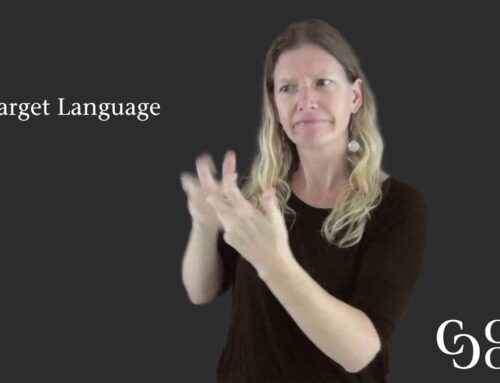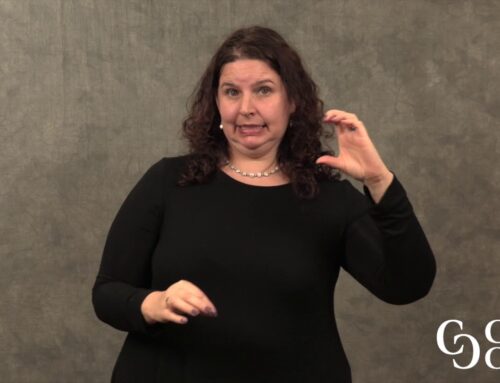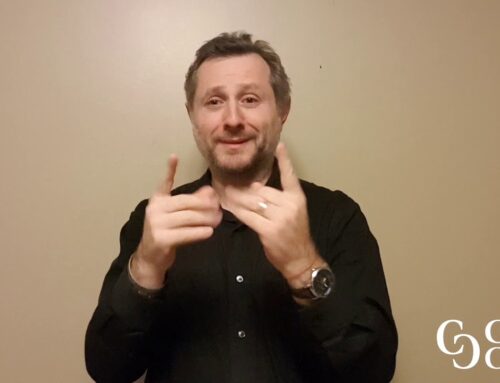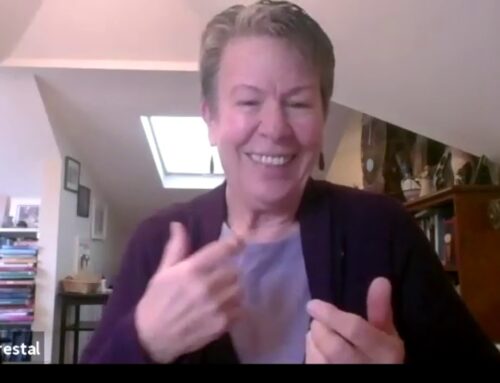April shares a story of persistence, perseverance, and success.
Translations/summaries are available below in both Spanish and English. These are designed as resources for working with the text in ASL. They are not intended to represent a definitive way to translate the text.
Visual Description
An African-American woman wearing long wooden earrings and a red top and is shown from the waist up. She is standing in front of a dark-grey screen. A white CATIE Center logo is in the lower right corner of the screen. The woman narrates the entire video in American Sign Language.
GTC Resource Library
Madre soltera afroamericana
Esta es información general.
No es fácil ser una madre soltera, no es fácil ser una mujer afroamericana, no es fácil ser una mujer sorda. ¿Por qué señalo estos tres aspectos?, pues porque yo salí embarazada a los 20 años y mi hijita nació cuando yo tenía 21 años de edad.
Yo era una alumna universitaria y continúe mis estudios tenazmente, pero cuando nació mi hija no tenía quien me la cuidara. La sociedad tiene una mala perspectiva de las mujeres afroamericanas: nos tiende a ver como mujeres que solemos embarazarnos a temprana edad, que típicamente abandonamos la universidad, y si eres sorda también ¡Ay, peor, pobrecita! ¡De verdad!
Mi vida continuó, y meses más adelante fui a visitar una universidad, me quedé observando, y me dije: “¿una hija me va a truncar la posibilidad de obtener mi educación?” ¡No, imposible!
Ingresé a la universidad con una bebé, estando sola, como madre soltera, sin ningún apoyo, quizás algo mínimo pero eso era todo, realmente la mayor parte lo hice sin nada. Avancé, terminé y llegué a la cima, tuve obstáculo tras obstáculo, muchos de ellos, y tuve que atravesarlos todos, y ¡Sí!, pude lograrlo.
Afroamericana, sorda, madre y aún soltera. ¡Sí!, es difícil, pero lo importante es que no te rindas, continua, la respuesta es continuar sin rendirse, impulsada con optimismo. Por eso tengo una hija, ella es el impulso que necesito para querer mejorar mi futuro.
Mi niña y yo somos personas, sordas, mujeres afroamericanos. Lo que la sociedad piensa está mal, eso es lo que se necesita cambiar, ese es el verdadero problema. El cambio puede realizarse demostrándoles que están equivocados, así es como se hace.
Si las personas tienen una idea equivocada, aprovecha para explicarles, educarlos. Enséñales lo que puedes hacer o cómo ellos pueden ayudarte, uno nunca sabe qué es lo que pueda pasar, tal vez algo bueno pueda salir de eso que siga a futuro.
Living as a Single Black Mother
Being a single mom, isn’t easy.
Being a Black woman, isn’t easy.
Being a Deaf woman, isn’t easy.
I would like to share with you the impact that all three identities have had on my life. I got pregnant when I was twenty and gave birth to my daughter at twenty-one. I was a college student at the time but did not have anyone to watch my newborn daughter. Society categorized me into version of the stereotypical Black teenager; “she’s just another young Black woman who keeps getting pregnant”. “She’s going to drop out of college”.
This is what I was dealing with as a Black Deaf single mom. A month later, baby in tow, I showed up at the college. I was not going to let anything get in my way of an education.
With barely any support, this single mom broke through every barrier placed in front of me. For all you Black Deaf single moms out there, it isn’t easy, trust me, but do not give up!
Be persistent. Be optimistic. Persevere.
I have a child in my life and I have to be there for both her and myself, as a role model for Black Deaf women. Society’s stereotypes need to change and by proving them wrong, we can do that. By sharing your story, educating people, and sharing your truth, you may just change the future.




